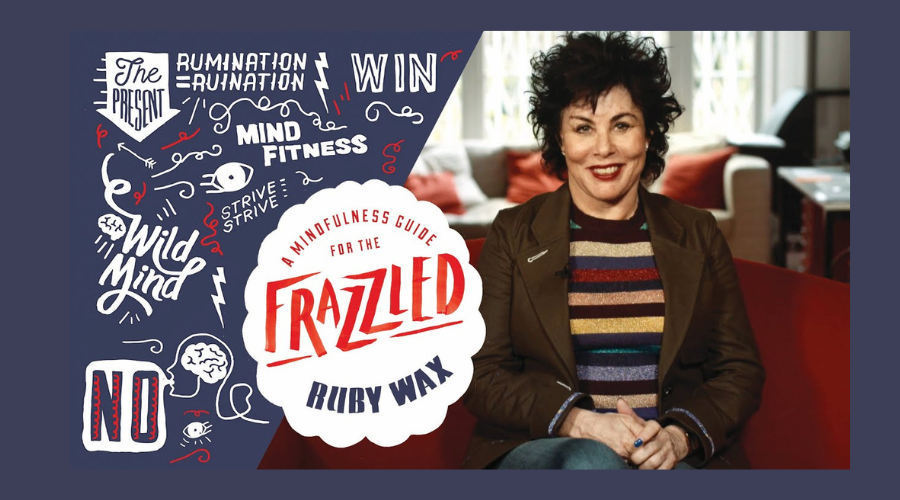Book Review: A Mindfulness Guide for the Frazzled by Ruby Wax
Ruby Wax recently released A Mindfulness Guide for the Frazzled – we were intrigued by the book, and asked Billy Burgess to write a review of it for us. Here are his thoughts.
Hi, we are Happy
We are leading a movement to create happy, empowered and productive workplaces.
How can we help you and your people to find joy in at least 80% of your work?

If you’re somewhat dubious about Ruby Wax’s suitability to educate the masses on mindfulness-based cognitive therapy (MBCT), consider this: in 2013, the actor and TV personality gained a Master’s degree in MBCT from Oxford University; she’s spent much of her latter career raising mental health awareness; and A Mindfulness Guide for the Frazzled follows her earlier mental health novel, Sane New World.
To compile this book, Wax referred to an extensive catalogue of academic sources (all of which are listed in the back of the book) as well as calling on a number of professors and neurologists to verify the meatier scientific information. However, Frazzled isn’t an academic manual nor is it aimed at people already comprehensively acquainted with MBCT.
As the title suggests, Wax wants to impart guidance to people who are overcome with stress and constant worries. She outlines the principles and fundamental practices of mindfulness and then exhaustively promotes its efficacy in soothing mental unrest, improving self-understanding and contributing to continued human evolution. As well as self-improvement, the book covers social mindfulness and ways mindfulness can assist with raising children and dealing with teenagers.
In the book’s second chapter, Wax provides a simple encapsulation of mindfulness: “Mindfulness is a way of exercising your ability to pay attention. When you can bring focus to something, the critical thoughts quieten down.”
She explains that this process equips us to soberly observe our thoughts, rather than simply getting bossed around by them. Subsequently, we can learn to face up to our feelings without any fear – “they’re just feelings and nothing to be scared of.”
Wax’s angle is quite personal – she has a background of severe depression and endured a tough, loveless childhood. Her most significant mental breakthrough came after applying the mindfulness practices that are laid out in chapter five’s six-week mindfulness course.
Now, you could be forgiven for presuming mindfulness is something practiced exclusively by self-absorbed mystics with dreadlocked hair and a wardrobe full of hemp robes. Self-help books, similarly, could prompt a decisive scoff. Wax realises the prevalence of these kinds of reservations and devotes a considerable number of ink to conveying the scientific vindication for MBCT.
She proposes the notion that stress only exists by virtue of humankind’s advanced evolution (it doesn’t affect our cousin, the ape). But, while we’re capable of wonderful ingenuity and each in possession of a ratatouille of emotions, we’re still animals and thus prone to automatic, primal responses.
These responses are often integral to survival, but they can also lead to panicked thoughts that are detrimental to our mental wellbeing. Rumination, in Wax’s reckoning, is an insidious vice. So instead of ruminating – that is, getting stuck in an infinite loop of neurosis, flickering between self-hatred and misanthropy – mindfulness can help us achieve a calmer, more productive and healthier relationship with the chaos fizzing around inside us.
Wax is careful to remind us that mindfulness isn’t just about “sitting in a chair marinating in your own thoughts and loving yourself.” Conversely, she emphasises the need to relinquish self-obsession and start thinking in more communal terms.
We’re all incredibly sensitive and receptive to the feelings of others, even if it’s not consciously apparent. She claims mindfulness will help prevent us from unconsciously passing our negative feelings onto others.
A slight criticism can be directed at Wax’s somewhat volatile tenor. Much of the book is written in a conversational tone, which contrasts to the sections relating neurological findings. Her jokey, conversational style does make Frazzled more immediately accessible, but the attempted humour generally feels contrived.
That said, the humour is effective in underlining Wax’s erstwhile scepticism towards mindfulness and associated activities such as silent retreats and day-long meditation sessions. And although she comes across as self-absorbed at times, she speaks with sympathy and concedes that a lot of her psychological recommendations are easier said than done.
Foibles aside, Wax is undoubtedly sincere in her avowal of the positive outcomes that can arise once you commit yourself to mindfulness. Frazzled is suitable for anyone looking to gain a more consistent and relaxed self-understanding, which will lead to stronger connections with friends, family and workmates.
Related blogs
- The Calming, Remedial Influence of Mindfulness — Mindfulness is a wonderful life skill. This blog gives a brief introduction to mindfulness.
- 4 Ways to Improve Your Relationship With Stress — We all experience stress but it doesn't need to be something we suffer, here are 4 ways to improve your relationship with stress.
- Five things I learned on Happy’s Mindfulness training course — An account of what blogger Billy Burgess learnt when he took the Happy Mindfulness training course.
Why not sign up to our newsletter?
Sign up to our monthly newsletter, full of tips, tricks and news to help you to be happier and more productive at work.
Want to learn more Mindfulness techniques?
Happy's one-day Mindfulness training course will introduce the concept of mindfulness and enable you to use simple practices for more creative and compassionate thinking in the workplace. Find out more
We also have a range of Personal Development Live Online Learning courses, including Assertiveness, which looks at the challenges of being assertive with colleagues online and communicating with those around you. Find out more
All of our personal development workshops are also available for private groups — contact us for availability and pricing.
Why learn online with Happy?
- Interactive and engaging - just like our classroom sessions
- Bitesize or full-day sessions - fit around your schedule
- Learn from home - all you need is a quiet place to call from and an internet connection
- No quibble money-back guarantee

Billy Burgess
Billy has been writing blogs for Happy since 2017, covering mindfulness, stress management, confidence building and emotional intelligence as well as offering handy tips for Office 365 users. He's also an established arts, culture and lifestyle writer.
